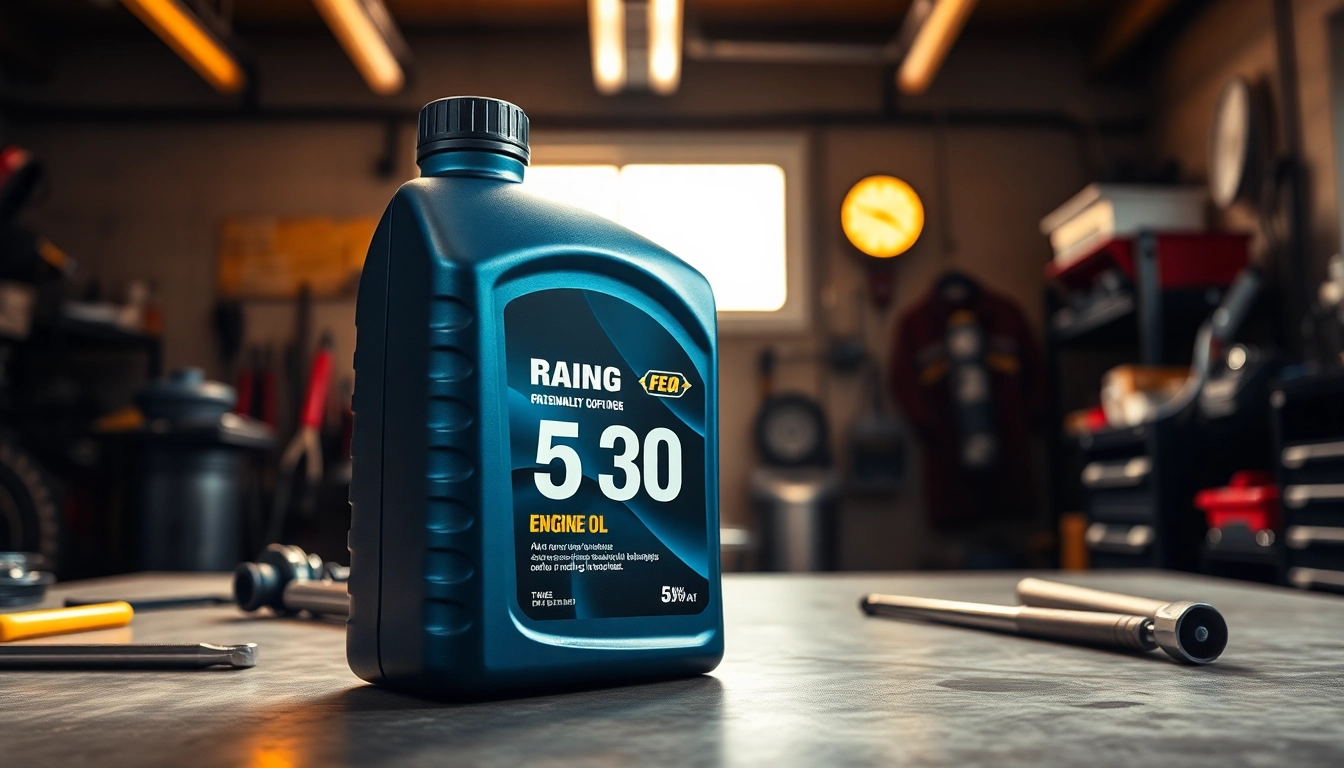Understanding Engine 5W30 Oil
What is 5W30 Oil?
5W30 oil is a type of multi-grade motor oil that is widely regarded for its ability to perform effectively in a variety of temperatures and conditions. The “5W” in its name indicates its viscosity in cold temperatures, while the “30” signifies its viscosity at operating temperatures. This oil provides reliable engine protection and performance, striking a balance between low-temperature fluidity and high-temperature stability. It is used in many light-duty petrol and diesel engines due to its versatility and effectiveness.
The Benefits of Using Engine 5W30 Oil
Using engine 5w30 oil comes with several advantages:
- Versatility: Suitable for a wide range of engine types, including those in cars, trucks, and SUVs, making it a go-to option for many drivers.
- Enhanced Protection: Offers superior lubrication and reduces engine wear over time, prolonging the life of your engine.
- Fuel Efficiency: Its balanced viscosity helps in optimizing fuel efficiency, allowing for better mileage.
- Cold Weather Performance: Maintains fluidity in low temperatures, ensuring easy starting and protection during cold starts.
Common Applications for 5W30 Motor Oil
5W30 motor oil is commonly used in various vehicles, including:
- Most petrol engine vehicles
- Modern SUV and light truck engines
- Many diesel engines, particularly in light-duty applications
- Vehicles requiring a fuel-efficient oil specification
How to Choose the Right Engine 5W30 Oil
Types of 5W30 Oils: Synthetic vs Conventional
When selecting 5W30 oil, you will typically face a choice between synthetic and conventional oils. Here’s a closer look:
- Synthetic Oil: Engineered to provide better performance in terms of temperature tolerance, synthetic oils offer better protection in extreme conditions and often contain advanced additives that enhance engine cleanliness and efficiency.
- Conventional Oil: Derived directly from crude oil and less refined than synthetic options, conventional oils are generally sufficient for older vehicles and those with simple engine designs. However, they may not provide the same level of protection or performance as synthetic oils.
Experts recommend using synthetic oil in modern engines for optimal performance, particularly if you frequently drive in severe conditions.
Key Features to Look For
When choosing the right 5W30 oil, consider the following features:
- API Certification: Look for the American Petroleum Institute (API) certification to ensure quality and safety standards are met.
- Additive Package: High-quality oil contains additives for corrosion resistance, oxidation stability, and improved cleaning properties.
- High-Temperature Stability: This is crucial for protecting your engine under extreme driving conditions.
Top Brands and Their Offerings
Several reputable brands offer quality 5W30 oils. Here are some of the most trusted options:
- Valvoline: Their High Mileage and Advanced Full Synthetic oils are popular for performance and protection.
- Mobil 1: Offers a diverse lineup of synthetic oils known for their longevity and reliability in various scenarios.
- ENEOS: Known for high-performance synthetic motor oils, especially their ENEOS 5W-30 Fully Synthetic Motor Oil, which offers enhanced piston cleanliness.
- Castrol: Offers a variety of synthetic oils focused on engine protection and performance enhancement.
5W30 Oil Performance and Maintenance
Oil Change Intervals for Engine 5W30 Oil
Changing your engine oil regularly is essential for maintaining engine health. Oil change intervals depend on several factors:
- Conventional Oil: It’s generally recommended to change every 3,000 to 5,000 miles or every three to six months.
- Synthetic Oil: This can often extend to 5,000 to 7,500 miles, depending on the manufacturer’s guidelines and driving conditions.
- Severe Conditions: If you drive in extreme conditions (high heat, heavy loads, stop-and-go traffic), consider shortening the interval.
Signs of Oil Degradation
Recognizing the signs of oil degradation can help you maintain optimal engine performance. Key indicators include:
- Dark Discoloration: Fresh oil is typically amber; dark oil can indicate contamination.
- Unusual Engine Sounds: Increased noise can signify inadequate lubrication.
- Oil Change Warning Light: Vehicles equipped with oil life monitoring systems will alert you when oil needs to be changed.
How to Properly Dispose of Used Oil
It’s crucial to dispose of used oil responsibly to protect the environment. Here’s how:
- Collection: Store used oil in a clean, leak-proof container.
- Locate a Recycling Center: Many auto parts stores and service stations offer recycling services. Check local regulations for disposal sites.
- Donation: Sometimes, used oil can be re-refined into new oil. Some companies may accept it for recycling.
Comparing Engine 5W30 Oil to Other Viscosities
5W30 vs 10W30: A Detailed Comparison
5W30 and 10W30 oils differ in their viscosity ratings, significantly impacting performance:
- Cold Weather Performance: 5W30 flows better at lower temperatures compared to 10W30, making it ideal for colder climates.
- High Temperature Performance: 10W30 may provide slightly better protection at higher temperatures due to its higher viscosity rating.
However, many modern vehicles perform best using 5W30, as it provides better performance in a broader temperature range.
When to Use 5W20 or 5W40 Instead
Choosing between oils like 5W20 or 5W40 involves understanding your vehicle’s specific requirements:
- 5W20: Thinner than 5W30, this oil is often recommended for newer engine designs focused on fuel efficiency.
- 5W40: Offers greater protection in high-performance or high-temperature environments. It is beneficial for engines that operate under heavy loads.
Myths about Oil Viscosity Explained
Several misconceptions surrounding oil viscosity can lead to confusion:
- Thicker is Always Better: Many believe that thicker oils offer better protection, but this can lead to inadequate flow and higher wear in modern engines.
- All Oils are the Same: The formulation and additives in oils vary significantly, affecting performance and engine health.
Frequently Asked Questions about Engine 5W30 Oil
What Vehicles Benefit Most from 5W30 Oil?
Vehicles designed for 5W30 oil typically include:
- Most newer petrol engines from leading manufacturers
- Many compact cars and hybrids focused on fuel efficiency
- Trucks and SUVs that traverse various terrains and climates
Common Misconceptions about Synthetic Oil
Some common beliefs about synthetic oil include:
- It’s only for luxury cars: Synthetic oils can benefit any vehicle, improving engine performance and longevity.
- More expensive means better: While premium synthetic oils offer benefits, not all expensive oils perform better than their cheaper counterparts. Always refer to specifications and reviews.
Can You Mix Different Brands of 5W30 Oil?
Mixing different brands of 5W30 oil is generally not recommended as different manufacturers use varying additive packages, which can affect performance. However, if you need to top-off oil during an emergency, ensure they are both 5W30 and compatible (e.g., both synthetic) as a temporary measure.



